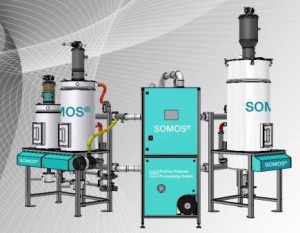At this year's Fakuma trade show, the primary focus of ProTec Polymer Processing is on system solutions for the efficient, flexible, and economical handling of materials: for drying, conveying, and dosing of pellets and mill base realized using SOMOS® brand equipment and systems.
Products on display include the new generation of stationary module drying systems in the material drying segment in combination with a SOMOS® D-Series drying air generator, and a gravimetric dosing system SOMOS® GRAMIX E from the dosing segment, featuring a sample configuration for injection molding using one main component and two high-precision small-dosing units. In addition, ProTec will present the SOLIDO LFT production system – customized for economical production of high-quality long-fiber reinforced thermoplastics with fiber lengths corresponding to pellet lengths – thus highlighting the company’s plant engineering expertise in the area of manufacturing innovative materials.
 The modular concept of the new SOMOS® D drying systems – consisting of a D-series drying air generator and up to 12 modular drying hoppers – offers high flexibility during the conceptualization and expansion of a stationary materials drying plant. Picture: ProTec Polymer Processing
The modular concept of the new SOMOS® D drying systems – consisting of a D-series drying air generator and up to 12 modular drying hoppers – offers high flexibility during the conceptualization and expansion of a stationary materials drying plant. Picture: ProTec Polymer Processing
Modular and highly efficient – the adapted SOMOS® D dryer system
At its trade show booth, ProTec will also highlight the performance and flexibility of the stationary module drying systems of the new energy-efficient SOMOS® D-Series by exhibiting a drying air generator SOMOS® D500 and two connected drying hopper module tables – one individual table with a 600-liter hopper (MT 600) and one double table with an MT 300 (300 liter) and an MT 100 (100 liter). The combination of several drying hoppers mounted on a single module table enables a compact, space-saving, and economical configuration of the drying system. The now complete series provides single, double, triple, and quadruple tables for the hopper sizes MT 50, MT 100, MT 200, and MT 300. Both of the largest drying hoppers (MT 400 and MT 600) are deeper and can therefore be equipped with matching deeper single and double module tables. All module tables can be configured and combined in almost any manner, which also facilitates the expansion of existing drying systems.
One drying air generator can feed up to 12 drying hoppers with dry air at a consistent low temperature of – 35 °C. In the process, the drying air throughput of a D-dryer can be flexibly adjusted to meet the current need, for example, for the D500, from 200 up to 500 m³/h. Other available frame sizes are: D300 for 100 up to 300 m³/h; D900 for 300 up to 900 m³/h; D1400 for 500 up to 1,400 m³/h. The dry air generators can be conveniently operated using a Siemens S7 controller, which centrally regulates the drying hopper (up to 12) as well as the accompanying conveyors for filling the hoppers. The tried and tested ALAV (for adapting the volume of drying air to the current material throughput) and Super-SOMOS® (for adjusting the desiccant regeneration to the actual moisture content of the adsorbent) control mechanisms used in SOMOS® dryers guarantee high levels of energy efficiency.
A special feature of the SOMOS® GRAMIX E gravimetric dosing and mixing system (for throughputs of up to 300 kg/h and up to 5 components) on display at Fakuma is the integrated small-volume dosing for material throughput of up to approx. 2 kg/h. Because of its highly sensitive weighing electronics, the dosing system can now dose volumes of 200 g/h – equivalent to around three grams per minute – reliably and accurately. This precision is required, for example, to dose very small amounts of highly concentrated master batches.
SOLIDO – premium LFT pellets for lightweight construction
The SOLIDO system technology presented by ProTec Polymer Processing at the Fakuma trade show is suitable for manufacturing a broad range of long-fiber reinforced thermoplastics (LFT) using a diverse polymer matrix and different types of fiber reinforcement. These composite materials are created with fibers of pellet length – lengths of 7 mm to 25 mm are the industry norm – using what is called the pultrusion process. With SOLIDO technology, the fiber strands – for example, glass or carbon fibers – are isolated in the impregnation tool to create the filaments. The individual fibers are then coated with the polymer melt (impregnated). After further processing, the LFT pellets manufactured in this way produce components with excellent surface quality and high mechanical strength. The technology can be used to realize fiber content of up to 60 percent by weight and plant sizes with throughputs of up to 1.2 t/h.
LFT pellets can be processed using injection molding and used for applications previously reserved for thermosetting plastics. In addition to high strength, stability and impact strength, lightweight components manufactured in this way exhibit excellent heat resistance. Automotive engineering in particular is currently a field of application for LFT. However, in future the advantages of this group of materials will not only have a lasting effect on the evolution of parts and components for the automotive industry. Even bioplastics can be "upgraded" in this way. In the form of LFT, they achieve the characteristics of technical plastics.
ProTec Polymer Processing GmbH with its headquarters in Bensheim combines the renowned brands SOMOS® and OHL as well as the new brand SOLIDO: Machines and complete system solutions for efficient material handling in all plastic treatment processes currently in use as well as machines for solid matter post-condensation of plastics and turn-key plants for bottle-to-bottle recycling of PET as well as plants for producing LFT pellets. ProTec Polymer Processing is a member of the Schoeller Polymer Industries group of companies (www.schoellerpolymerindustries.com). The inclusion in the global sales and service network of the Schoeller Group (www.schoeller.org) offers the optimal infrastructure for a comprehensive on-site customer service.